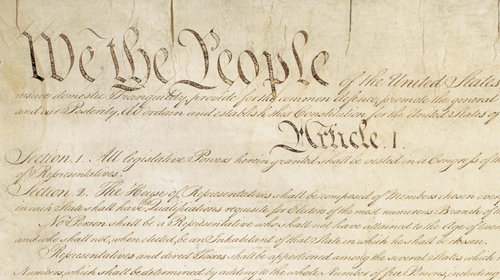
We Americans cherish few rights more than the right to speak our minds. And yet that right often comes under attack. Most recently, the federal government has used laws criminalizing the “material support” of foreign terrorist organizations to prosecute people who hold unpopular political views. Take the case of Tarek Mehanna, a native of Sudbury, Massachusetts.
Almost exactly one year ago, Mehanna was convicted of providing “material support” to al Qaeda. He was later sentenced to over 17 years in prison. In a trial that lasted thirty-five days, the vast majority of the government’s case focused on Mehanna’s views on global politics, war, and religion. He was convicted in large part based on evidence that he translated publicly available al Qaeda propaganda from Arabic to English and tried to persuade others to embrace his extreme views.
Mehanna’s views would shock many Americans. They are offensive and often hateful. At times Mehanna agreed with al Qaeda and parroted its views (at times he also expressly disagreed with the group).
But the right to hold and espouse offensive views is one of our nation’s essential liberties. Just last year, for example, in the case of the Westboro Baptist Church, the Supreme Court upheld the Church’s right to picket and protest the funerals of our soldiers with signs bearing repulsive messages: “God Hates the USA/Thank God for 9/11,” “Thank God for Dead Soldiers,” and “Thank God for IEDs.”
That case is but one in a long line in which the Supreme Court has made clear that even odious political advocacy is protected unless it would incite imminent lawlessness or unless the speaker is an “active member” in a criminal group and intends to support its illegal ends. These are high standards, but they are vital in our democracy to prevent the government from criminalizing thought and speech that it—or even a majority of us—disagrees with. The solution to vile speech is more speech in response, not government prosecution.
In spite of this robust protection for unpopular ideas, the government argued that Mehanna could be convicted for translating al Qaeda propaganda because, in the government’s view, Mehanna knew that al Qaeda would want the materials translated and did the translations to assist the group. The district court incorrectly accepted the government’s expansive theory and took the unusual step of instructing Mehanna’s jury not to “worry about” the First Amendment. The court authorized the jury to punish Mehanna’s political advocacy based on bare “coordination” with al Qaeda, a term that the jury was free to define expansively because the district court did not define it at all. (As Mehanna’s lawyers point out in their appeal of his conviction, the government presented no evidence that Mehanna ever communicated with al Qaeda let alone that he acted at its direction).
The problem boils down to this: the government equated rhetorical support with “material support,” and the district court accepted its view. What makes the government’s theory so dangerous to our freedom of speech is that it threatens to dismantle the barrier that the Supreme Court has erected “between words and deeds, between ideas and conduct.” That barrier prevents the government from censoring speech based solely on its tendency to persuade and, thereby, overturning the most basic precept underlying the Supreme Court’s First Amendment case law: that “[t]he mere tendency of speech to encourage unlawful acts is not a sufficient reason for banning it.” It preserves the fragile space necessary to formulate ideas, to persuade others, and to be persuaded by others. When speech spills over into unlawful conduct, the government may, of course, act. But until then, speech is protected.
Mehanna’s case illustrates that principle well. In addition to arguing that Mehanna could be convicted based on his speech, the government argued that Mehanna had travelled to Yemen in an unsuccessful attempt to find an al Qaeda training camp. At best (and Mehanna’s lawyers contest this), this theory might have permitted a jury to convict Mehanna of attempting to provide “material support”—himself—to al Qaeda. But the jury was allowed to convict Mehanna on either theory—that he engaged in unlawful conduct or that he engaged in offensive advocacy—without indicating which it believed. Unlawful conduct is a proper basis for criminal prosecution and conviction; offensive advocacy is not.
Our nation’s history painfully documents the tendency of government to suppress dissent and unpopular expression in times of crisis only to regret it later. When we empower a jury to imprison fellow citizens for their thoughts and expressions—however offensive and crude—we risk, as the Supreme Court has said, “sanction[ing] the subversion of one of those liberties...which makes the defense of the Nation worthwhile.” As the Court has cautioned, the greater the perceived threat to our way of life, “the more imperative is the need to preserve inviolate” our ideals of free expression.
That Mehanna could have been convicted for his political advocacy alone undermines our dedication to those principles.
Today, the ACLU and the ACLU of Massachusetts filed a friend-of-the-court brief in Mehanna’s appeal arguing that his speech, though extreme, is protected by the Constitution. You can read our brief here.
Learn more about the political advocacy: Sign up for breaking news alerts,follow us on Twitter, and like us on Facebook.



